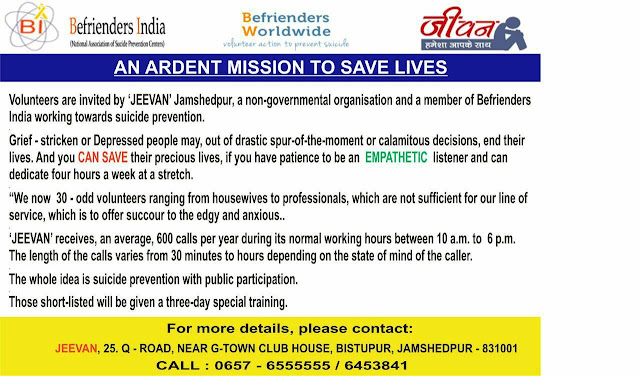OUR VISION IS TO CONTRIBUTE TO A SOCIETY WHERE SUICIDE IS UNDERSTOOD BOTH LOCALLY AND GLOBALLY LEADING TO FEWER DEATHS BY SUICIDE . Timings: Morning 10AM to 6PM (All Days), Helpline No.: 9297777499 / 9297777500/ 9255435500/9255377500 Address : 25,Q Road, Bistupur, Jamshedpur - 831001 Email : jeevanjamshedpur@gmail.com YOU CAN WRITE TO US / CONTACT/VISIT US. WE KEEP EVERYTHING CONFIDENTIAL.
Thursday 30 November 2017
Monday 2 October 2017
#PSYCHOLOGY BEHIND # BLUE WHALE GAMES
THANKS TO THE LINKS BELOW :
1. http://www.livemint.com/Technology/Vl7hs1wPEqlicnoNEGsD2I/What-makes-online-games-like-Blue-Whale-so-addictive.html

1. http://www.livemint.com/Technology/Vl7hs1wPEqlicnoNEGsD2I/What-makes-online-games-like-Blue-Whale-so-addictive.html
The Aerosol Challenge, a 2014 game, involved teenagers spraying themselves with deodorant at a distance of just a few inches from their skin, to see who could endure the pain the longest. It left some children with horrific burns.
In the Pass-out Challenge, young adults would choke themselves to the point of passing out in an attempt to reach an euphoric high—recording it all to post on social media.
The Fire Challenge saw people spraying themselves with flammable liquid and then setting it aflame, all for an online laugh. Neknominate had them drinking increasingly potent combinations of alcohol—this too led to some deaths. The Blue Whale game, the latest, sets tasks over a 50-day period, the last of which is jumping off a high-rise.
During Roman times, gladiatorial shows were a show of strength and violence. The Middle Ages turned execution into spectacle. Now, it’s online games like Blue Whale, says Shubha Madhusudhan, clinical psychologist, Fortis Hospital, Bengaluru. “We have always had narcissistic personalities, sadists and psychopathic deviants in our society,” she says. The internet has just made it easier for all of them to connect with the vulnerable.
But what makes online gaming so addictive?
A spiral of challenges and achievements
Most games are addictive because of the challenge involved, says Mehul Shah, a 24-year-old gamer who can understand the need to complete tasks, even in an extreme game like Blue Whale. “There’s constant competition, ranking boards, level up, which drive you to be the best amongst others. Once you’re in it, there’s no coming back and you strive hard to achieve the next level, the next goal.”
As a student, four years ago, he would log on to Dota 2, a multiplayer game, for 10-12 hours a day; now that he has a job, he plays for 2-3 hours a day. “Some gamers get so involved that they can’t differentiate between a real and virtual challenge. Completing the next task, reaching the final, is the only thing that matters even if it’s an extreme one,” says Shah.
The virtual game world is designed to suck you in, just like any other addiction, explains Sandeep Vohra, senior consultant psychiatrist, Indraprastha Apollo Hospitals, New Delhi. The first few levels are invariably easier, so they give you a sense of achievement, but as you go higher, the levels become tougher, and you have to spend more time and energy in getting the same high. “This sense of achievement targets the brain’s reward system and compels the gamer to perform the act again and again so as to dip into that pleasure of achievement again,” says Dr Vohra. There is an additional high: the feeling that you can solve something, even if it’s not a real-life issue, he adds.
Free of expectations
Then there’s the anonymity that the online world offers, freeing you from societal and real-life expectations and responsibility, says Deepti Kukreja, consultant psychiatrist, Nanavati Super Specialty Hospital, Mumbai. “There is no control, no authority, no one is watching over you, and you can explore things, be someone else. All this makes it very, very tempting to experiment, seek out an adventure, take a risk,” she adds.
Some games and online challenges make you feel like a lord, agrees Himanshu Goyal, a Bengaluru-based entertainment marketing professional who has been a gamer since he was 9. The constant action makes you feel like you’re a hero, that you’re up to something amazing. “In real life, you might be a mediocre person with a 9-5 job, but in your virtual one, you become a game lord, a hero, people follow you, they look up to you, and that beats anything real life would offer,” says Goyal. He actually believes that decades of gaming has improved his reflexes and ability to think spontaneously.
Too much gaming, however, can blur the boundaries between virtual and real, says Manjiri Deshpande, psychiatrist, The Pediatric Network, a Mumbai-based child health support company: “You might get so involved in a game that you forget that in online games, heroes die and reappear in the next level, but in real life, the real world, it’s not possible.”
Games or experiments?
Challenges may be a big part of gaming online but Mumbai-based gaming professional Anuragh Saukat says self-mutilation has nothing to do with video games. “They’re more about social experiments built on the anonymity that the internet brings,” says the 23-year-old, who has an online record of spending 805 continuous hours (gameplay time, without getting killed in the virtual game) playing his favourite game Destiny. “With legit online services like the PlayStation or Xbox Live, companies like Microsoft and Sony have game rules and play conditions to make sure that all players are accountable for their action in the game world. When I play Destiny, there is an interface, a set of UI/UX (user experience/user interface), codes and rules which make it a game world where I play with a virtual team. The Blue Whale is not a game, it’s a social experiment to exploit vulnerable people. ”
The challenges of self-harm and self-mutilation games go beyond basic and normal human motivations, agrees John Suler, professor, Science and Technology Center, Rider University, US, and author of Psychology Of The Digital Age. “People who play these games are hurting themselves,” he explains. This might be indicative, at a deeper level, of depression, feeling bad about oneself, or an underlying need to be punished. “For some of these people involved in dominance/submission games, it could be an acting out of sadomasochism needs,” he says.
In the past, people would engage in self-harm alone, in secrecy. Now they can find like-minded people online. “They support each other in self-harm and share tips about how to do it,” says Prof. Suler.
Those vulnerable to self-harm challenges online include teenagers and young adults who are going through biological and hormonal changes, says Sameer Malhotra, senior consultant psychiatrist and drug de-addiction specialist, Max Healthcare, Delhi. “Vulnerable people would have feelings of emptiness and loneliness, or an impulsive personality trait which is high on suggestibility, a low or fragile self-esteem, and a constant need for peer approval.” Adults who have a substance abuse or self-harm history, can’t structure their time and live without prioritizing or without a goal in life, would be susceptible to the thrill that such challenges offer, adds Dr Malhotra.
How online psychopaths work
It’s exactly these vulnerable personalities that online psychopaths aim for with challenges like Blue Whale, says Dr Kukreja. Moderators offer a sympathetic ear, listen to your problems, then tempt you with a secret game, a community online where you can belong, with others like you, people who understand you. “Then comes a challenge: Can’t you do this for me? Are you not strong enough? Smart enough? It’s a challenge, a dare,” says Dr Kukreja.
The moderator questions their competence, and connects the tasks to their self-esteem. The gamer wants to progress, become part of the elite group, take the ladder up, watch a horror movie, light up a deodorant, walk alone at night on a deserted street—and before he knows it, the task has become an extreme one. “And you do it, because completing each challenge builds your self-esteem and gives you a high,” says Dr Kukreja, “while at every step, the sociopath, the one who controls, is taking pleasure in the submission and physical harm they cause.”
Reality check
■ Look out for the hidden intentions of strangers you meet online
■ If you’re going through a lonely phase, don’t look to the internet for solace. Go to friends, family, counsellors
■ Be assertive, say no to challenges or dares. Don’t take impulsive decisions
■ Know the dangers of the internet. It’s a virtual world, don’t confuse it with reality.
Warning signs
As someone around you heading into the vortex of self-harm? Here are the signs to look out for.
■ Frequent outbursts of anger, fragile self-esteem, difficulty in controlling emotions
■ Getting irritated and moody when the game is taken away or stopped
■ Sudden changes in behaviour—becoming secretive, fluctuations in mood or difficulty in sleeping
■ Marks of self-harm on the body
■ Disinterest in daily life
2. https://psychcentral.com/blog/archives/2017/07/13/the-blue-whale-challenge-is-real-sad-frightening/

“game” played on social media called the Blue Whale Challenge tests teenagers’ and young adults’ ability to follow a set of steps that eventually leads to them dying by suicide. The #bluewhalechallenge has been questioned by some authorities as to whether it really exists, but it’s clear that some teens are taking their own lives due to the game.
What is the Blue Whale Challenge and how can you stop your child or teen from taking part in it?
The “game” is simply following a set of fairly dumb directives given to the teen or child by a “curator.” The curator is one of the game’s organizers and leaders; twisted individuals who reach out to children, teens, and young adults via social media. Teens are usually the ones to make first contact, due to suicidal feelings they are experiencing. People who play the game are known as “whales.”
I say “dumb,” because the directives involve unoriginal cutting and self-harm activities to show your loyalty and commitment to the game and your curator. In fact, out of the supposed 50 steps involved in the game, the game designer became so lazy he just made steps 30-49 the same generic thing:
Everyday you wake up at 4:20 am, watch horror videos, listen to music that “they” send you, make 1 cut on your body per day, talk “to a whale.”
This is not exactly a directive that demonstrates much in the way of creativity (then again, neither is choosing the color “blue” for the whale). It shows a significant laziness in the game’s design. The originator of the game probably thought something along the lines of, “I need to get to Step 50, but don’t have enough ideas for all 49 intervening steps… so we’ll just do this instead.”
Is it Real?
Yes. One of the game’s steps is to post the “#i_am_whale” hashtag on the social media account of players. A quick search on this term finds thousands of occurrences of it on Twitter, VKontakte, Instagram, and other social networking websites. This makes the game very much a real phenomenon, but we don’t yet know how many teens have actually taken their lives trying to follow all 50 steps of the game.
The Psychology of the Blue Whale Challenge
The psychology behind the blue whale challenge is simple — find victims, create an emotional bond with them through an arbitrary set of steps demanding completion in order to move forward in the game, and then hope they follow through to Step 50, “Jump off a high building. Take your life.”
This is the creation of someone who is likely a psychopath or sociopath, or has significant tendencies of psychopathy. This “game” isn’t really a game at all. It’s simply a control and manipulation scheme directed toward vulnerable people who have serious thoughts of suicide, loneliness, and death.
When a person is suicidal, they feel most of all alone and worthless. The game creator understood these feelings (probably having felt them themselves at some point in their lives), and is taking advantage of these kinds of feelings.
What better way to make someone feel like they are together with others than have them identify as an arbitrary mammal (a whale)? And what better way to make them feel a little less worthless than have them succeed at a series of tasks anyone could perform?
What You Can Do About It
You can tell someone is playing the game pretty easily, as they will have cuts on their hands with either the number 57 and/or 40 on them. You can check their social media accounts (the game says to use VKontakte, but users are using whatever social media they are currently on) and see if they’ve posted anything similar to #i_am_whale, a hashtag used in one of the steps of the game.
The game is easily defeated by talking to your teen, child, or young adult about their suicidal feelings, and encouraging them to reach out to get help for them through psychotherapy or counseling. It’s not an easy conversation to have, but it may be a life-saving talk.
Teens and young adults need to understand — you’re at the very beginning of your life. No matter how bad you feel right now (and I understand, as I felt as bad or worse than you when I was a teen), it will get better. You may not believe me, but why take the words of a stranger in the first place — whether it’s to play a dumb game or something else? Reach out to your friends (or an adult, if you can) and see if you can find a different way to cope with these feelings.
And remember, don’t throw away your shot.
Monday 25 September 2017
ADVISORY ON "BLUE WHALE CHALLENGE GAME" - BY GOVERNMENT
ADVISORY ON "BLUE WHALE CHALLENGE GAME"
BY GOVERNMENT :
http://meity.gov.in/advisory-blue-whale-challenge-game
BY GOVERNMENT :
http://meity.gov.in/advisory-blue-whale-challenge-game
Blue whale game (The suicide game) is abetment to suicide. It is understood through various internet reports that it is shared among secretive groups on social media networks. The creators seek out their players/victims who are in depression and send them an invitation to join. The basis of the challenge is that an anonymous “group administrator,” otherwise known as “the curator,” hands out 50 tasks to selected “players” that must be completed, documented and posted during a 50-day period. Players of the challenge can’t stop playing once they’ve started; they are blackmailed and cyber bullied into completing the “game”.
Look out for following Signs and symptoms:
- Becoming withdrawn from friends and family
- Persistent low mood and unhappiness
- Child seems to be worried that stops him from carrying out day to day tasks
- Sudden outbursts of anger directed at themselves or others
- Loss of interest in activities that they used to enjoy
- Visible marks like deep cuts or wounds on any part of the body of the child.
How to protect your child from this game:
- Check in with your child, ask how things are going. Ask if there have been things stressing them, or anything that has them worried. If your child is talking about any level of distress, do not hesitate to ask them about changes in mental health.
- Unless there is reason to believe your child already knows of or has played the game, don't discuss about the Blue Whale game. By doing so, you increase the chance that your child will search for it on their own.
- Monitor your children's online and social media activity to ensure they are not engaging with this game.
- Keep your eyes open for:
- Unusually secretive behaviour, mostly related to their online activity
- A sudden increase in the time they spend online, especially social media
- They seem to change screens on their device when approached
- They become withdrawn or angry, after using the internet or sending text messages
- Their device suddenly has many new phone numbers and email contacts
- Install a good cyber/mobile parenting software which helps them in monitoring your children.
- Parents should take reports from child counsellor present in the school at regular intervals.
- If you fear your child may be at risk, get professional help right away.
- Remind your child that you are there and will support them as they face life challenges.
For further information, You may visit the following URLs :
(a) http://ncpcr.gov.in/showfile.php?lang=1&level=1&sublinkid=1267&lid=1499(link is external)
(b) http://infosecawareness.in/Know-About-Blue-Whale-Suicide-Game(link is external)
Wednesday 13 September 2017
Thursday 17 August 2017
Monday 8 May 2017
Monday 24 April 2017
Saturday 1 April 2017
Wednesday 15 February 2017
Subscribe to:
Posts (Atom)
Motivation - गहराई से सोचो !
गहराई से सोचो ! आपकी ज़िंदगी का कोच कौन है ?? अनीता_अल्वारेज, अमेरिका की एक पेशेवर तैराक हैं जो वर्ल्ड चैंपियनशिप के दौरान परफॉर्म करने क...
-
About us Jeevan sanstha is a member of of BEFRIENDERS INDIA . Befrienders India is a member of the Internation...
-
our link Contact us FACE TO FACE - 25,Q Road, Bistupur, Jamshedpur - 831001, Morning 10AM to 6PM (All ...
-
गहराई से सोचो ! आपकी ज़िंदगी का कोच कौन है ?? अनीता_अल्वारेज, अमेरिका की एक पेशेवर तैराक हैं जो वर्ल्ड चैंपियनशिप के दौरान परफॉर्म करने क...














